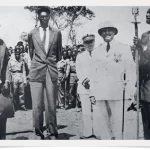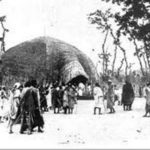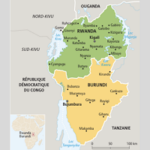King And Chief On Ijwi Island
One early legacy of colonial rule in Africa was an academic focus on the process of elite formation in African societies. A product of the perceived political needs of the early independence period, this perspective generally emphasized manpower development as the critical element of bureaucratic stability and political modernization. It was postulated that individual leaders were progressive nation builders, in contrast to the backward and conservative masses, and therefore studies on the early postcolonial period devoted little attention to the specific interactions between members of the elite and the masses.’
Still less attention was given to the significance of these relationships for the rural people involved. By the very fact of their powerlessness, these people were not considered part of the political nexus. However, as Joan Vincent has recently indicated, the character of a political system may best be understood by examining the nature of its impact on the powerless, rather than by describing its structure or stated objectives and focusing on the incorporation of elites into the hierarchical political framework. Indeed, the very existence of a large relatively powerless sector of society is itself an important indicator of the quality and conception of politics within that society.
Emphasis on the process of elite formation has also focused attention on the role of “traditional elites.” Wherever possible, Belgian colonial policy combined the two categories of precolonial authority and colonially imposed authority within the single concept of traditional elite, in an attempt to cloak colonial administrative personnel in the garb of legitimacy. Despite such attempts to forge a sense of continuity, the transformation from a precolonial to a colonial context was significant. It affected local authorities in two ways: in their loss of status (particularly in the loss of sovereignty) and in the extension of new powers applicable to the local context. The loss of sovereignty was felt most directly by the elites themselves, while the new powers placed in the hands of the elites were realized at the expense of the population in general. But there is a sense in which these two aspects of the transition to colonial rule were intimately related, for the issues of sovereignty and legitimacy affected the quality of administration, and especially the nature of relations between elites and others, in ways that reinforced each other. These two themes—the different types of “traditional” authority in the colonial context on the one hand, and the relationship between local administrative authorities and the population on the other—will provide the focus for this essay.
Ijwi is a large island, some forty kilometers north to south, its width varying from two to ten kilometers east and west, located in Lake Kivu on Zaire’s eastern border. Prior to colonial rule, Ijwi formed a single kingdom, but colonial administrative divisions permitted two types of chiefly rule to coexist, one in the north of the island, one in the south. In the 1970s, the two men who headed the administration in each sector were members of the same family of precolonial rulers: though of different descent lines within the dynasty, they shared a common ancestor four and five generations distant. Nonetheless, despite their common family ties and their common position within the present administrative structures, there were important differences in the character of their rule on Ijwi. The two men were regarded differently by their populations, they exercised their powers differently, and they entertained markedly different relations with the political hierarchy of the state. We shall first trace the careers of the two segments of the royal family during the colonial period, and then examine certain political changes affecting the status and powers of the political authorities, and their effect on political life on Ijwi.
Ijwi in the Precolonial Period: The Competing Lines of Royal Division
The schism of the royal family into two segments had roots that long preceded the European arrival on Lake Kivu. So also did the tactics that members of each segment employed in their competition with each other. Members of the dynasty arrived on the island in the early nineteenth century, and over the next decades the senior descent line—those who possessed kingship—progressively reinforcedtheir political penetration within Ijwi society. During this period their major concerns focused on the issue of sovereignty: independence from external political control. From the late nineteenth century, however, members of the junior line, attempting to consolidate their power in the north of the island, seized on foreign support whenever this opportunity presented itself. Historically less concerned with sovereignty, they were more concerned with forging external alliances to assure their less-than-secure position. These different political concerns, reflected in markedly different tactics, reinforced the lines of cleavage and thus subsequently had an enduring influence on Ijwi politics.
Despite the common political focus shared by the people of Ijwi in the late nineteenth century, they were internally distinguished on historical and cultural grounds, particularly in terms of their identification with royalty. The political differences were also reflected in geographical features. Ijwi was divided into two roughly equal parts by a rugged, heavily forested mountain belt stretching east and west across the middle of the island. This area was virtually unpopulated even late into the twentieth century, and so defined the population into two geographical segments, the northern and southern parts of the island.
A high proportion of the present population descends from immigrants who came to Ijwi in the late eighteenth and early nineteenth centuries, about the same time as the royal dynasty, the Basibula. The nonroyal groups, however, did not arrive on Ijwi with the royal family, nor did they come from the same areas. The development of royal authority on Ijwi was a slow process; throughout the nineteenth century, the central court was only partially integrated into the heterogeneous Ijwi population. Although the first king, Mwendanga, and his successor Kabego (died 1875) established residences in both the north and south of Ijwi, the political focus for each king was in the southern portion of the island.
The kings did, however, send sons and brothers to various areas of Ijwi. Over a period of three generations, one of those families, located in the north of the island, began to develop its own identity as a segment of the royal dynasty op-posed to the senior line in the south. It is important that the early political status of this group rested on their role as representatives of a nominally superior political power. Their perceived functions and priorities derived from higher authority, and their status and primary political identity were associated essentially with “outside” networks; they did not seek to be accepted within the new society by marriage ties or ritual as did their cousins in the south. Indeed, their adeptness in adapting to such external power networks would later provide an excel-lent platform from which to launch their successful colonial careers.
During the last quarter of the nineteenth century, Ijwi was subjected to a series of attacks by the troops of the Rwandan king Rwabugiri. At one level the struggle to retain sovereignty against the Rwandan incursion served to unify the Ijwi population. But it also crystallized internal conflicts associated with a developing succession struggle among the sons of Kabego, the Ijwi king. By adroitly exploiting these cleavages within the Ijwi royal family, Rwabugiri was able to mount a successful attack on the island, during which Kabego was killed. Although the Ijwi royal family was subsequently dispersed, two of its members remained on the island as Rwabugiri’s representatives, one in the south and one in the north.
The preeminent member of the royal family in the north at this time was a man named Tabaro, a grandson of the first Ijwi king. After the death of Kabego, the competition between the descent lines of the royal family intensified as each sought control of the entire island. Eventually Tabaro was killed by his primary adversary in the south, Nkundiye; Tabaro’s son Bera, then but a child, escaped to Rwanda. Later, following the death of Rwabugiri and the reestablishment of the Sibula dynasty on the island toward the very end of the nineteenth century, Bera returned to Ijwi, where he, in his turn, became involved in conflicts with other members of the royal family more proximate to royal power than he. Once again he fled to Rwanda, where he was to stay for many years. He learned much during this self-imposed exile, and he was later to turn to his advantage the political lessons acquired in Rwanda.
https://uk.amateka.net/king-and-chief-on-ijwi-island/https://uk.amateka.net/wp-content/uploads/2023/12/kivu.pnghttps://uk.amateka.net/wp-content/uploads/2023/12/kivu-150x150.pngSocial & cultureOne early legacy of colonial rule in Africa was an academic focus on the process of elite formation in African societies. A product of the perceived political needs of the early independence period, this perspective generally emphasized manpower development as the critical element of bureaucratic stability and political modernization....BarataBarata rpierre@ikaze.netAdministratorAMATEKA | HISTORY OF RWANDA



